Analyze the symbolism and lessons of the seven key wells in the Bible, and discover a new depth to these ancient narratives.
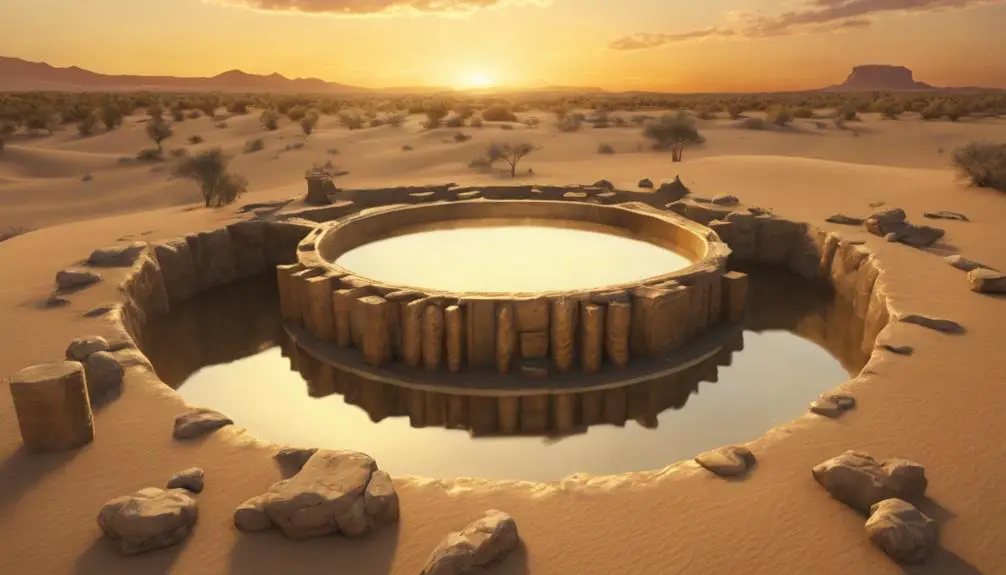
Seven Wells in the Bible
Did you know there are seven key wells mentioned in the Bible, each with its own significant narrative?
From Hagar's Well, which symbolizes hope, to Isaac's Wells, teaching us about persistence, these ancient water sources tell intriguing tales.
Let's not forget Jacob's Well, a notable meeting place, or The Well of Harod, where Gideon's victory unfolded.
Engage in this discussion to uncover the rich symbolism and profound lessons behind each well, and you might just find yourself viewing these biblical stories in a whole new light.
Key Takeaways
- Wells in the Bible symbolize divine intervention, hope, and spiritual transformation, serving as meeting points for significant biblical narratives.
- Hagar's and Isaac's Wells represent resilience, divine intervention, and the power of persistence amid adversity.
- Jacob's Well and Beer Lahai Roi exemplify spiritual encounters and transformations, signifying divine revelations and presence.
- The Well of Harod symbolizes divine triumph, fearlessness, and the transformative power of faith.
Hagar's Well: A Symbol of Hope
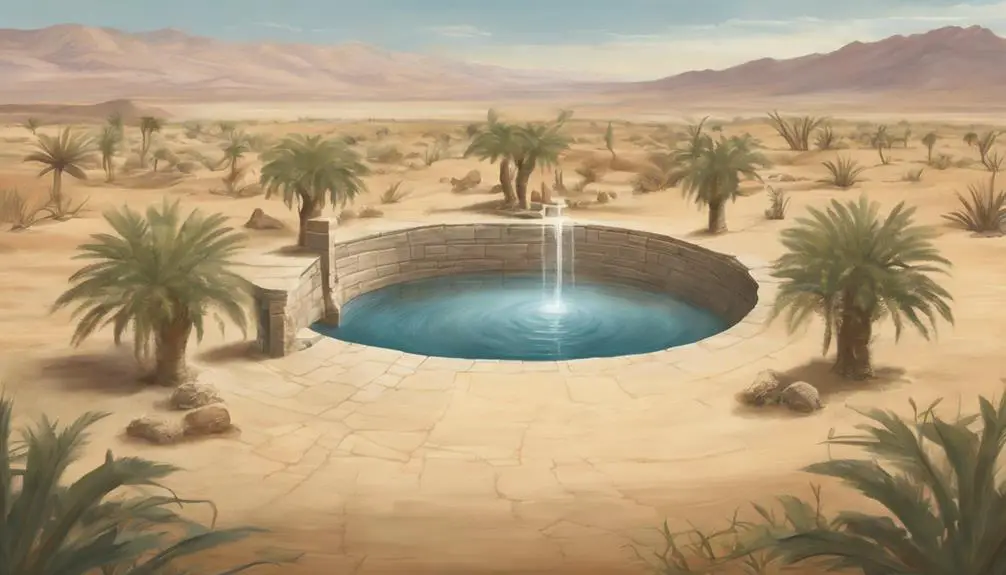
Delving into the story of Hagar's Well, you'll find it serves as a profound symbol of hope in biblical literature. The well's appearance signifies Divine intervention at a critical moment, illuminating Hagar's resilience and faith in the face of adversity.
From a scholarly perspective, Hagar's Well is more than a physical object; it embodies the promise of salvation and deliverance, particularly when there seems to be no way out. As an Egyptian slave, Hagar finds herself in dire straits, abandoned, and on the brink of despair. Yet, her strength and determination to survive, evident in her relentless search for water, are indicative of her resilience.
The well's sudden manifestation isn't a mere coincidence; it's a direct result of Divine intervention. Notably, God doesn't just provide water; He gives Hagar a well, a constant source of sustenance, signifying ongoing provision and care.
Analyzed metaphorically, Hagar's Well stands as a beacon of hope in times of despair, a testament to the belief that God's intervention can transform hopeless situations. Thus, the narrative of Hagar's Well serves as a potent reminder of the power of resilience and the promise of Divine intervention in the midst of trying circumstances.
Isaac's Wells: Lessons on Persistence
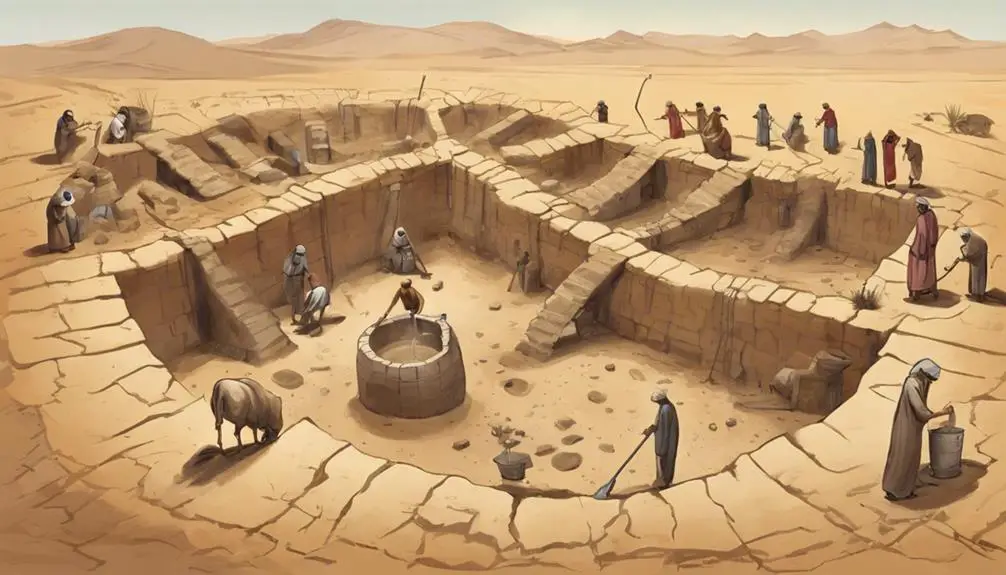
Just as Hagar's Well symbolizes divine intervention and hope, the narrative of Isaac's Wells in the Bible offers valuable insights into the virtue of persistence. This story, steeped in challenges and conflict, emphasizes Isaac's determination, a quality that can inspire you in your own life journey.
The narrative of Isaac's Wells has three key lessons:
- Digging Deeper: Isaac's resolve to dig deeper, despite the Philistines filling his father's wells with earth, is a profound metaphor. It signifies the importance of persistence, even when faced with obstacles that seem insurmountable.
- Non-Retaliation: Despite the Philistines' repeated hostility, Isaac chooses not to retaliate but to move on and dig new wells. This teaches us the wisdom of choosing peace over conflict.
- God's Provision: Isaac's unwavering faith leads to God's provision of water, symbolizing divine sustenance amidst adversity.
In analyzing these elements, you can draw parallels with your own experiences. When you're faced with challenges, will you exhibit Isaac's determination to dig deeper? Can you choose peace over retaliation? And finally, can you hold steadfast in faith, knowing that divine provision is available amidst adversity? Isaac's Wells thus serve as wellsprings of wisdom in demonstrating the power of persistence.
Jacob's Well: A Meeting Place
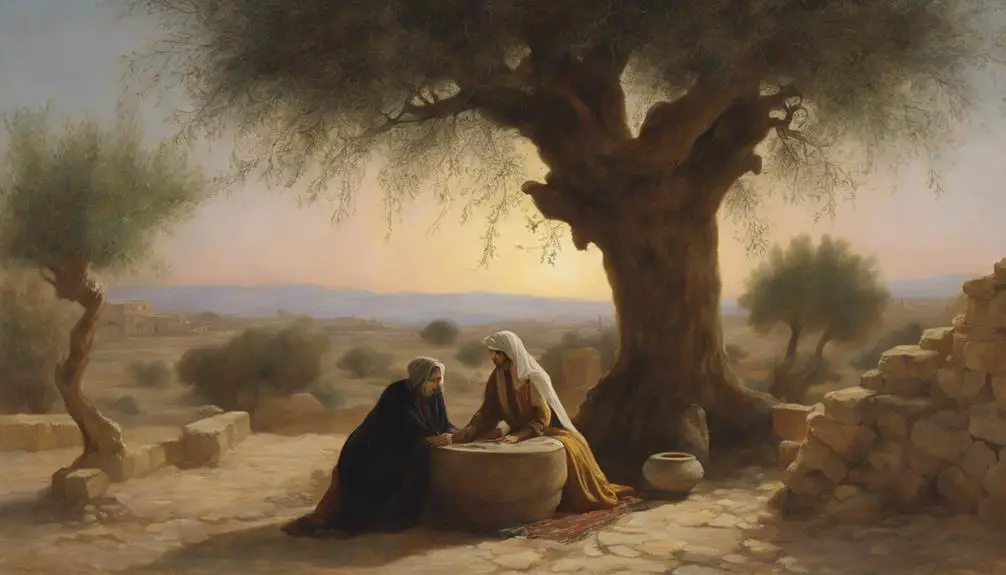
Turning now to Jacob's Well, we find it serving not just as a source of water, but also as a remarkable meeting place in biblical narratives. Noted for its depth and perennial supply, it's a unique symbol of sustenance and life in a parched land. But it's Jacob's encounter at this well that adds another dimension to its significance.
Jacob's encounter with a woman, later revealed as Jesus, at the well, transformed it into a spiritual crossroad. This encounter led to a profound dialogue about living water, a metaphor for the Holy Spirit. The woman, initially focused on the physical thirst, was enlightened about a thirst of a different kind – a spiritual thirst that only Jesus could quench.
This meeting spot thus carries an immense spiritual significance. It's not just a place where the thirst of the body is quenched, but also where the thirst of the soul finds satisfaction. Jacob's Well serves as a reminder that God meets us in unexpected places, extending an invitation to a deeper spiritual communion. It needs to be understood not just in its physical context, but in its spiritual resonance as well.
The Well of Harod: The Gideon's Victory
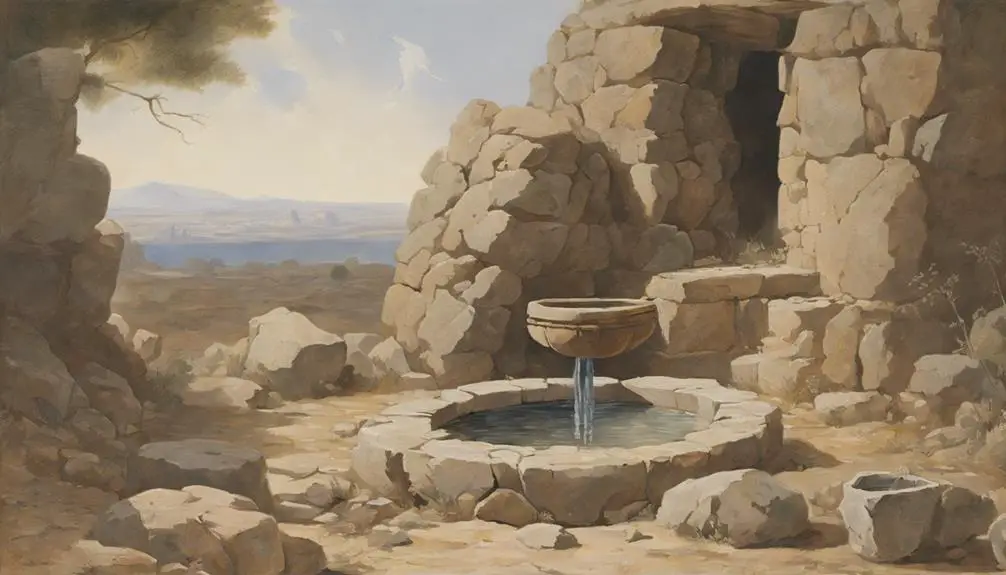
Shifting our focus to the Well of Harod, we find it at the center of Gideon's victory, an event that showcases divine intervention and the triumph of faith over fear in the biblical narrative. This well, more than just a geographical marker, carries a profound symbolism in the story of Gideon.
Harod's significance extends beyond being the setting of Gideon's victory. It's a place where:
- God's power was demonstrated through Gideon's strategy.
- The fear and trembling of Gideon's army were transformed into a fearless resolve.
- The faith of a small group of 300 men overcame the might of a vast enemy.
The Well of Harod, therefore, stands as a symbol of divine selection and God's ability to use the least to achieve the greatest. Gideon's strategy, guided by divine wisdom, resulted in a victory that echoed God's promise to Israel.
Beer Lahai Roi: The Well of Living Sight
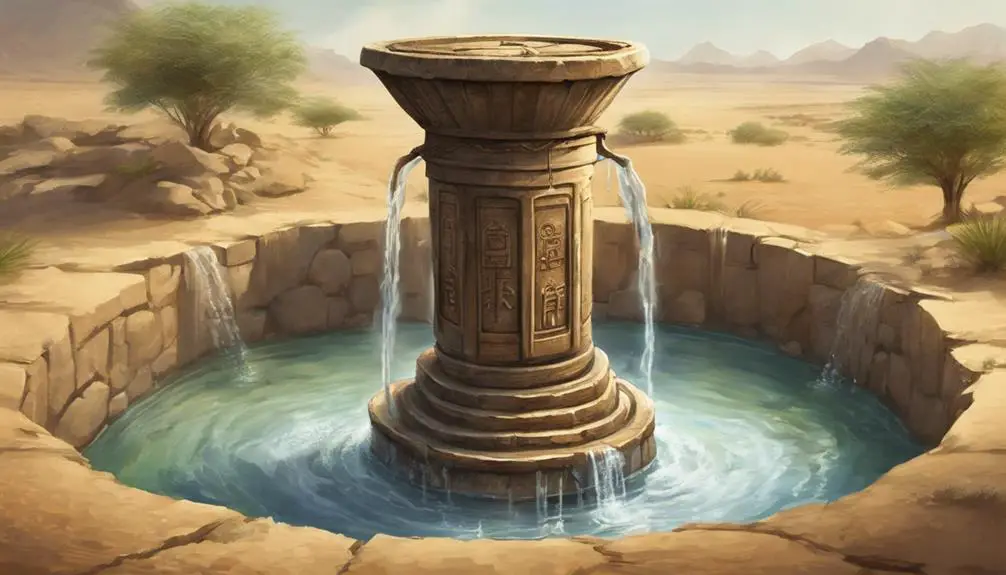
Drawing parallels from Gideon's victory at Harod, we find another well of notable importance in the biblical narrative – Beer Lahai Roi, also known as the Well of Living Sight. This well, deeply rooted in Biblical geography, represents a site of divine revelations.
Here's a table to give you a better understanding:
Biblical Character |
Location |
Significance |
|---|---|---|
Hagar |
Genesis 16:14 |
Site of Divine Revelation |
Isaac |
Genesis 24:62 |
Place of Meditation |
Jacob |
Genesis 25:11 |
Dwelling Place |
Hagar, the Egyptian maidservant, encountered God here, thus the name 'Well of Living Sight'. This marked the first divine revelation at Beer Lahai Roi. The well also holds significance for Isaac, as it was his place of meditation, and for Jacob, who dwelt near it.
Beer Lahai Roi illuminates a divine presence in the mundane aspects of life. It's a reminder that divine revelations can occur in the most unexpected places, breaking the boundaries of sacred spaces. It further showcases the fluidity of Biblical geography, where physical locations intertwine with spiritual experiences.
Frequently Asked Questions
Are There Any Other Significant Wells Mentioned in the Bible That Are Not Included in This Article?
Yes, there are other significant wells not mentioned here. You'll find them through careful study of biblical archaeology.
Well symbolism, in particular, is rich in the Bible, suggesting spiritual rejuvenation and divine encounters. They serve as meeting places, prophetic symbols, and even sites of miracles.
What Is the Significance of Water Wells in Biblical Times and How Does It Relate to the Spiritual Metaphors in the Bible?
In biblical times, wells symbolize life's sustenance, often linked to divine provision. They're crucial in biblical hygiene practices, providing water for purification rites.
Spiritually, they represent God's living water, signifying spiritual nourishment and cleansing.
How Did the Geographical Locations of These Wells Influence the Biblical Narratives Associated With Them?
You'll find the locations of these wells greatly shaped the linked biblical narratives. The wells' symbolism and their prophetic connections were often dictated by their geography.
For instance, a well in a barren area could symbolize God's provision in desolation. The wells served as significant landmarks, influencing the biblical characters' journeys and actions, thereby directly impacting the unfolding of biblical narratives.
Were These Wells Used for Any Other Purposes Besides Sourcing Water in Biblical Times?
Yes, besides sourcing water, these wells had other uses in biblical times. They're key in understanding biblical archeology and well symbolism. Wells served as gathering spots, facilitating important encounters and negotiations. They're often settings for significant biblical events, symbolizing life, prosperity, and God's provision.
For instance, Isaac's servants unearthed wells, signifying God's blessing. So, you see, in the Bible, wells weren't just for water; they held greater, symbolic significance.
How Has the Historical Understanding and Interpretation of These Biblical Wells Evolved Over Time?
Over time, your understanding of biblical wells has evolved due to archaeological evidence and scholarly interpretations. They're not just water sources anymore; they've gained symbolic significance too.
For instance, they've been seen as meeting points, places of divine revelation, and symbols of abundance. So, archaeological discoveries and biblical studies have helped you to see these wells as more than just physical structures, but also as significant elements in biblical narratives and symbols.
Conclusion
In your exploration of biblical wells, you've traversed the terrain of hope, persistence, encounter, victory, and divine visibility.
You've met Hagar at her well of hope, joined Isaac in his persistent digging, encountered the Samaritan woman with Jacob, witnessed Gideon's triumph at Harod, and finally, gazed upon the divine at Beer Lahai Roi.
Each well offers a unique insight, encouraging you to dig deeper in your understanding of biblical narratives and their enduring lessons.



Sign up